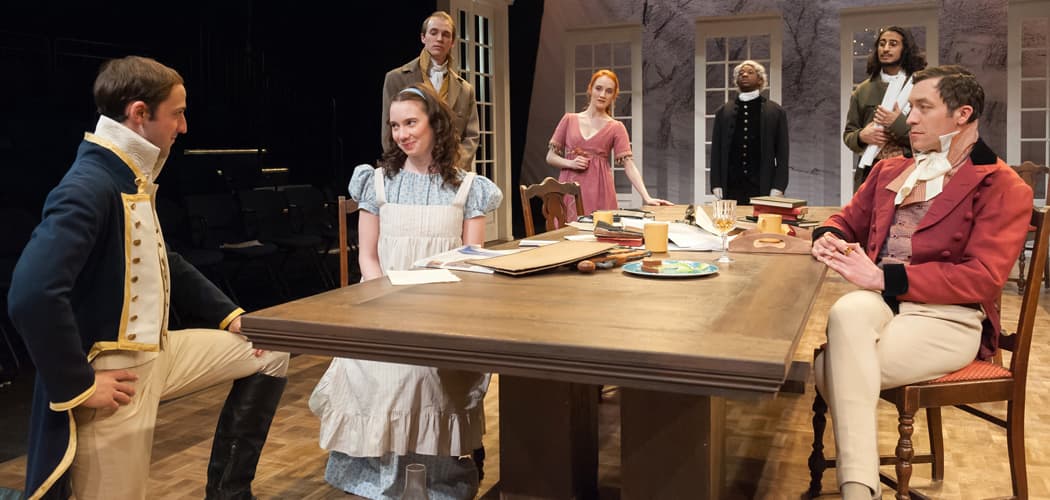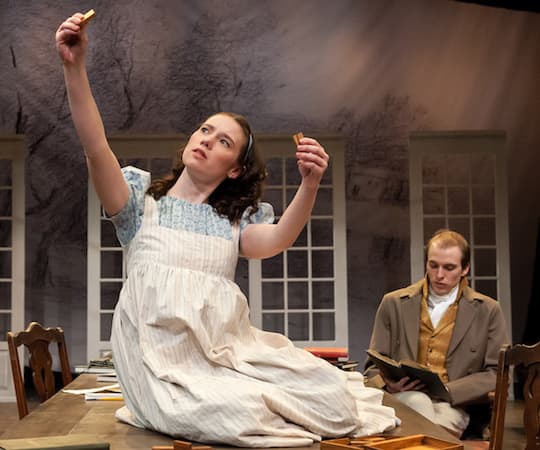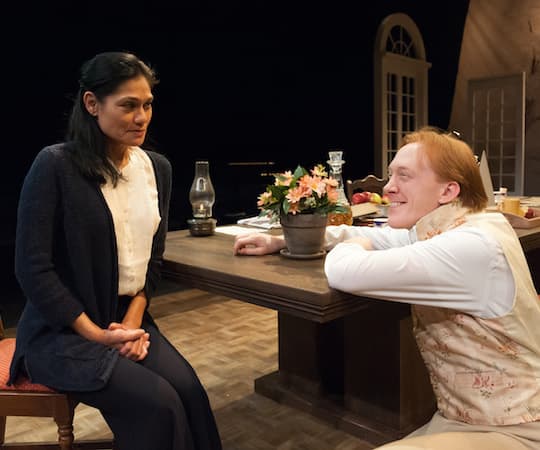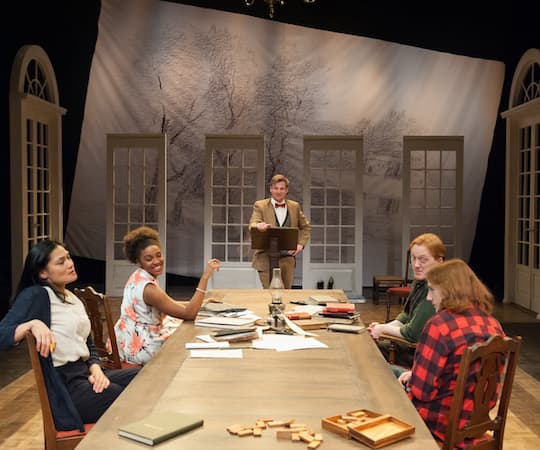Advertisement
'Arcadia' Intertwines Science With Sex, Past With Present, At Central Square Theater

Tom Stoppard’s 1993 play “Arcadia,” running through May 1 at the Central Square Theater in Cambridge, is a work built on parallels. The story jumps nimbly between past and present. Farcical sex romps and satire about the ascendance of celebrity culture unfold in frictionless accord next to dramatic, scientific and mathematical discoveries.
The action takes place in Derbyshire, England, at Arcadia, the estate of an aristocratic family. Janie E. Howland’s set — a long table, some chairs, a row of tall windows that serve to sketch in the confines of a grand room and, beyond the windows, a literal sketch of a landscape — remains constant as the time periods, and the casts, shift back and forth.
In 1809, 16-year-old Thomasina (Kira Patterson) is perched on the edge of sexual awakening, but her mind has already quickened to intellectual pursuits. Among other startlingly prescient insights, she instinctively grasps that the Newtonian physics of her day are not enough to answer some profoundly unsettling questions. As Thomasina notes, once you’ve stirred jam into your rice pudding, you can’t simply reverse the direction in which you’re moving the spoon and un-stir the jam back into a neat little blob. Why is that, and what does it mean for the eventual fate of the universe?

Before introducing thoughts about the “heat death” of the cosmos, Stoppard inoculates us against existential terror by introducing the play’s other major theme: Sex. In the play’s very first line, Thomasina wonders aloud what “carnal embrace” could be; from there, it’s off to the races. The universe may be winding down and cooling off, but as long as human passion runs hot we needn’t become morose over the long-term prospects of the cosmos as a whole.
It seems Thomasina’s tutor, Septimus Hodge (Will Madden), has been seen canoodling with the wife of one of the estate’s guests, an aspiring poet named Ezra Chater (Alexander Platt). When Chater bursts in demanding a duel, Hodge — in fine farcical form — defuses the situation by heaping backhanded, double-entendre laden praise on Chater’s new book, a long-form poem called “The Couch of Eros.”
Despite Septimus’ efforts to contain the situation, the scandal very nearly explodes out of his control, and the farcical energy grows as more characters enter the fray — Lady Croom (Sarah Oakes Muirhead), Captain Brice (Jesse Garlick), and an esteemed landscape architect named Noakes (Harsh J. Gagoomal), whose plans for the estate seem nothing short of entropy incarnate: He wants to tear up the garden’s smooth terrain and artfully grouped trees and replace it all with something wild and gloomy. Helping to spread disorder (sometimes, intriguingly, by means of a form of sign language) is the butler, Jellaby (Elbert Joseph). There’s also one more houseguest, someone we hear of but do not see, and that someone is Lord Byron.
Byron turns out to be the crux of the matter. Jump forward about two centuries and the mansion’s grand room is the same (though the garden, we learn, is not). A new generation of aristocrats live in the house, including a mathematically-inclined biologist named Valentine (Matthew Zahnzinger), his sister Chloe (Jade Wheeler) and their younger brother, the painfully shy Gus (Max Jackson).

The present-day version of the estate also has its share of houseguests: A writer named Hannah Jarvis (Celeste Oliva) is one; a university academic named Bernard Nightingale (Ross MacDonald) soon becomes another. Hannah is there to do research on a little-known historical figure — a hermit who once lived on the estate — and Bernard is looking for what he hopes will be a major new revelation about Lord Byron, whom he believes was embroiled in an unknown drama that took place at Arcadia. Bernard has something of a tabloid mentality, but the rigorous habits of thought that Hannah and Valentine bring to the mix start to yield results; meantime, erotic sparks start to warm between the various characters.
Stoppard twines sex and science into a single complex strand the same way he plays past and present off one another, portraying time as not only continuous but forever unfolding in a series of similar patterns. One might quibble with the parity Stoppard assigns lust and physics; when the modern-day characters talk about sexuality being “the attraction that Newton left out,” you can feel the unnecessary and inevitably clumsy attempt at reconciling two things that don’t need to be reconciled. (Why do science-themed plays so often feel the need to apologize for their intellectual subject matter?) But the play is tightly constructed and, even though it’s three hours long, there is a feeling that every scene and every line are necessary to the work’s realization.
Another quibble might be how the play tonally distinguishes the two time periods. The past is depicted as roundly merry and a little reckless; to quote Monty Python out of context, “It is a silly place.” The scientific drama around Thomasina’s fundamentally important questions is, in a sense, the bitter pill that’s being sugarcoated. The present, by contrast, is treated more as a drama, if not a morality play — it’s an academic procedural that’s laced with sexual frisson and sprinkled with comedy.

The Nora Theatre Company cast rolls with it under the direction of artistic director Lee Mikeska Gardner, although one gets the sense that Gardner is more comfortable with the tone and style of the passages set in the present day, and not quite certain of just how farcical to allow the sections set in 1809 to become.
Overall, Gardner strikes the right balance, while the actors mostly pull it off. Patterson is perfect as Thomasina, blending girlish zest for mathematics and horseplay with a gradually growing sexual interest. As if in counterpoint, Oliva’s Jarvis is cool of comportment, and sometimes downright humorless. But she is also indisputably competent, smart, and — despite herself — attracted to Bernard’s strutting puffery, which MacDonald plays just right. Zahnzinger handles some complicated math-centric exposition effortlessly though at other times he’s a bit too stiff and fussy. Platt’s Chater is suitably broad to fit the farcical feel of the 1809 scenes, but it’s a pity his character never seems to break into three dimensions. As Septimus, Madden fares better, in part because he’s given more to do and a broader range to do it in, but I was never sold on the snow job his character attempted on the self-absorbed dullard Chater.
The design work is well done all around. Costuming is another crucial distinguishing feature between the two time periods (and, as the actions of past and present converge on the final scene, the costuming also overlaps in a clever way). Leslie Held does a fine job here. John R. Malinowski handles the lighting, which for the most part is all about clarity but on occasion takes in a softer, more poetic quality. Nathan Leigh’s sound design incorporates era-spanning piano performances and the sound of a large engine (part of Noakes’ entropy-enhancing garden do-over), helping make the transitions from past to present feel seamless.
“Arcadia” continues through May 1 at the Central Square Theater. For tickets and more information, visit the website.